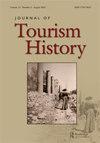船上的捷克人:班轮、集装箱和大海
IF 0.9
Q4 HOSPITALITY, LEISURE, SPORT & TOURISM
引用次数: 0
摘要
摘要这篇文章将旅行家们笔下的殖民时代晚期捷克人前往东南亚的海上航行与作者最近乘坐集装箱船从鹿特丹到新加坡的航行并置,这是一个诗意的比喻。这是对海上旅行的反思,也是历史研究的一次实验,它讲述了通过一次航行的经历来了解过去。文章对规模、速度、时间和现代性进行了反思;关于过去和现在的容器、阶级、国家、殖民地和帝国。我们现在的旅程如何帮助我们了解过去旅行者的经历,以及我们与他们的关系、我们的距离和远近?古老的游记如何丰富我们对当今旅行、航运和殖民主义的看法?在物理、经济和工业现实与叙事/诗意想象之间的流动边界上,现在、过去和未来是如何相互渗透的?本文追溯了集装箱化的(前)历史,它是如何成为我们“知识生产”的一部分的?这篇文章用捷克口音回答了这些问题,反映了一个特定的历史情况和不同殖民地的欧洲人民的自我形象,他们在新旧殖民地和帝国的世界中,尤其是以滑稽的不当方式航行。本文章由计算机程序翻译,如有差异,请以英文原文为准。
Czechs on ships: liners, containers and the sea
ABSTRACT The essay juxtaposes, as in a poetic metaphor, Czech sea voyages to Southeast Asia in the late colonial era, as described in the travellers’ writings, and the author’s recent voyage on a container ship from Rotterdam to Singapore. A reflection on sea travel and an experiment in historical research, it is an account of accessing the past through the experience of a voyage. The essay reflects on size, speed, time, and modernity; on containers, classes, nations, colonies, and empires, past and present. How can our present journeys help us grasp the experiences of past travellers, as well as our relationship with them, our nearness and our distance? How can old travelogues enrich our perception of present-day travel, shipping, and colonialisms? How do present, past and future overflow into each other, on the fluid borders between physical, economic and industrial reality and narrative/poetic imagination? How is containerisation, whose (pre)history this essay traces, part of our ‘knowledge production’? The essay performs these questions with a Czech accent that reflects a specific historical situation and the self-image of a variously colonised European people who navigate(d) in particular, often clownishly improper ways, in the world of colonies and empires, old and new.
求助全文
通过发布文献求助,成功后即可免费获取论文全文。
去求助
来源期刊

Journal of Tourism History
HOSPITALITY, LEISURE, SPORT & TOURISM-
CiteScore
0.60
自引率
0.00%
发文量
16
期刊介绍:
The Journal of Tourism History is the primary venue for peer-reviewed scholarship covering all aspects of the evolution of tourism from earliest times to the postwar world. Articles address all regions of the globe and often adopt interdisciplinary approaches for exploring the past. The Journal of Tourism History is particularly (though not exclusively) interested in promoting the study of areas and subjects underrepresented in current scholarship, work for example examining the history of tourism in Asia and Africa, as well as developments that took place before the nineteenth century. In addition to peer-reviewed articles, Journal of Tourism History also features short articles about particularly useful archival collections, book reviews, review essays, and round table discussions that explore developing areas of tourism scholarship. The Editorial Board hopes that these additions will prompt further exploration of issues such as the vectors along which tourism spread, the evolution of specific types of ‘niche’ tourism, and the intersections of tourism history with the environment, medicine, politics, and more.
 求助内容:
求助内容: 应助结果提醒方式:
应助结果提醒方式:


